Small Majority Of Americans Favor Abolishing The Electoral College
A new poll finds that a small majority of Americans support abolishing the Electoral College, but that's not nearly enough to make any change in how we elect Presidents possible.
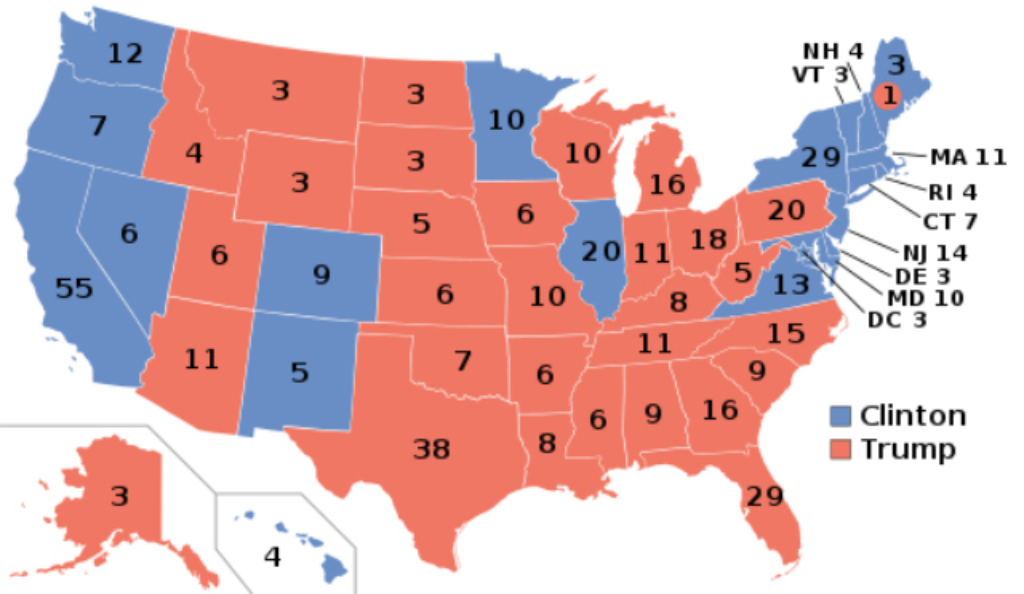
A new poll finds that a slight majority of Americans supports abolishing the Electoral College in favor of a national popular vote, but the odds that this will happen any time in the foreseeable future are extremely low:
A majority of voters says the Electoral College system should be abandoned in favor of a national popular vote, according to a new poll.
The latest NBC News-Wall Street Journal survey finds that 53 percent of voters say the outcome of the presidential election should be determined by the popular vote, with 43 percent saying the Electoral College system should remain in place.
Democrats are increasingly advocating to abolish the Electoral College. The party’s 2016 presidential nominee, Hillary Clinton, received nearly 3 million more votes overall than President Trump in 2016, but she only received 232 electoral votes, compared to Trump’s 306.
A similar scenario played out for Democrats in 2000, when then-Vice President Al Gore won the popular vote but lost in the Electoral College to then-Texas Gov. George W. Bush.
Support for moving away from the Electoral College system cuts sharply along partisan lines.
Seventy-nine percent of Democrats say the popular vote should determine the outcome of the presidential election, while 74 percent of Republicans say the nation should stick with the Electoral College. Independents are almost evenly split, with 49 percent saying popular vote and 44 percent saying Electoral College.
Advocates for change say the current system places outsized importance on a handful of swing-states. Defenders of the Electoral College argue that the system ensures candidates pay attention to rural areas and low-population states.
To some extent, this is consistent with previous polling on this issue, which has shown that at least a small majority of Americans would favor getting rid of the Electoral College. A 2011 poll from Gallup, for example, found that as many as 62% of Americans, including 53% of Republicans, would support abolishing the system that has picked every American President since George Washington and only been significantly modified once via the 12th Amendment. Support for that position seemed to drop, though, in a poll taken in the immediate aftermath of the 2016 election which showed that support for eliminating the Electoral College had dropped to 49%. Of course, it’s worth noting that the main reason for this drop appeared to be the fact that support for switching to a popular vote had dropped significantly among Republicans and had become a minority position on the right. Additionally, support for the idea had also cratered among self-identified Independents. These numbers also appeared in a poll taken in December 2016 by Marist College, which showed that a bare majority of 52% of voters favored abolishment while 45% favored keeping the present system for electing Presidents. By the summer of last year, public opinion seemed to swing back in favor of abolishment with 62% of respondents to one poll saying that they would prefer electing Presidents based on the nationwide popular vote rather than the Electoral College. More recently, two polls, one from Morning Consult and the other from The Hill showed majority support for abolishment. In the Morning Consult poll, support for abolishment was at 50% while it stood at 44% in the poll from The Hill.
Whatever the number, it has been relatively true in recent years that the largest amount of support for either position, keeping the Electoral College or replacing it with a national popular vote system, has consistently been on the side of abolishment of the institution that has been used to pick every President with the exception of Gerald Ford for the past 230 years. In no small part, of course, this is due to the fact that two of the past five elections have resulted in the person who lost the popular vote nonetheless winning the Presidency due to their majority in the Electoral College. Despite the fact that it has appeared to happen frequently based on recent election results, in reality, this split between the popular vote has only happened five times in American history, including the Election of 1824, the Election of 1876, the Election of 1888, and, of course, the elections in 2000 and 2016.
While opponents of the Electoral College are likely to greet these most recent poll numbers as good news, the reality is that the news is actually fairly grim with respect to any concerted effort to change the way we elect Presidents. In order to accomplish this, of course, we would need to amend the Constitution at the very least. This kind of reform would also likely call for significant changes to Federal and state election laws to reflect the new system. In order to amend the Constitution, we would need a two-thirds affirmative vote from both the House of Representatives and the Senate, followed by ratification by three-fourths of the States. Given the current makeup of the House, that would require at least 55 Republican House members to join all Democrats in supporting such an Amendment. In the Senate, it would require 20 Republican Senators to join all Democrats. After that, we would need to see ratification by 38 of the 50 states, most likely within whatever time limits Congress has set for ratification.
This is simply not likely in the current political climate and is even less likely when polling is showing that only a bare majority of Americans support the idea of abolishing the Electoral College. At the very least, it seems it would require nearly overwhelming popular support for abolishment, somewhere in the neighborhood of 70% or higher, and majority support across the partisan divide. In such a situation, members of the House and Senate, as well as members of state legislatures, would have to be subject to significant political pressure to approve such an Amendment. Until we reach that point, the system we have now will remain in place.
Perhaps what the movement to abolish the Electoral College needs is something that would prompt Republicans to change their position on the issue. Since they have benefited from the two most recent times that there has been a split between the Electoral College and the popular vote, Republicans arguably have little political incentive to support such a significant change in how we elect Presidents. If they ended up on the losing side of a split, though, that attitude might change. Until then the nation is likely to remain in what is essentially a 50-50 divide on the issue.
It should be noted that this post is not intended to address the policy arguments in favor of or against the Electoral College. In the past, both James Joyner and Steven Taylor have expressed their support for abolishment while I have been more skeptical of the idea, tending to support things such as modification in the manner in which Electoral Votes are allocated by the states and related issues. Notwithstanding that position, I am willing to at least admit that there are good arguments in favor of a pure national popular vote as well. Those are policy argument, however, best left to another post or series of posts. My point here is merely that, as a political matter, there simply is not sufficient political support at this time to believe that a movement to abolish the Electoral College would succeed at this time. Unless and until that changes, we will continue with the way things have been since 1789.

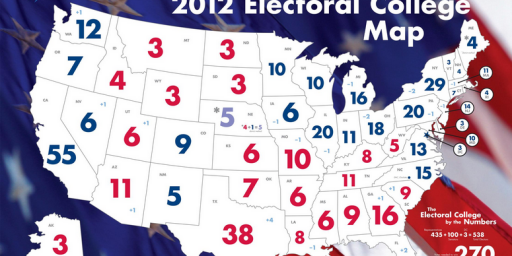
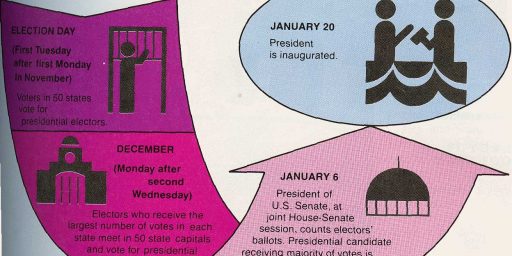
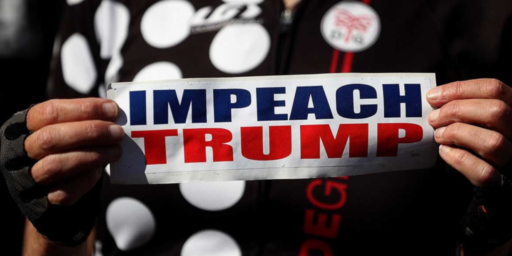

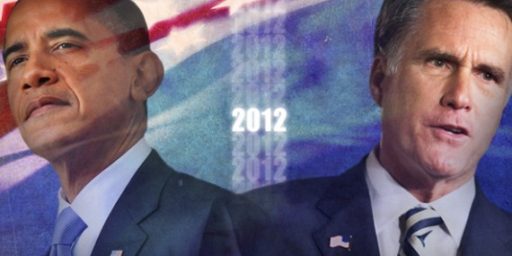
Have you forgotten about the Interstate Compact? I thought it’s been covered here. It’s still a major uphill battle, but it’s far closer to happening than a constitutional amendment, which as you point out would require 2/3rds support in both houses of Congress and 3/4th of the states. The compact doesn’t require Congress at all, and it may not even require a simple majority of the states, let alone 3/4ths–all it requires is enough states that they collectively hold a majority of electoral votes.
If Biden wins the EC next year but loses the popular vote by, say, one vote, the lame duck Senate would whip up a bill abolishing the Electoral College so quickly, you’d think McConnell had been replaced by The Flash.
@Kylopod:
Pursuant to Ariticle I, Section 10 of the Constitution that compact would need to be approved by Congress.
Specifically Article I, Section 10, Clause 3 which provides:
No State shall, without the Consent of Congress…….enter into any Agreement or Compact with another State.”
@Doug Mataconis: That’s a matter of debate.
@Kathy:
Put down the bong.
@Kylopod:
It seems clear to me that an interstate compact that would fundamentally change the manner in which Presidents are elected is most assuredly one in which Congress and the nation would “can have no possible objection or have any interest in interfering with.”
@Doug Mataconis:
Not to mention it would trigger so many lawsuits, lawyers would be assured employment for a generation.
Ok. Maybe I exaggerate, but the matter would head straight into court, and would marinate there for years, maybe even decades. That’s assuming it ever gets enough states to sign on(*), which is doubtful.
(*) I know it kicks in when the number of EC votes of all subscribed states reaches 270, not based on how many states sign on.
@Doug Mataconis: What if states decided that they would give their electors to the national popular vote winner, without any agreement with the other states?
There’s no compact there, and unless I am failing to think of some edge case, no chance that this would ever flip things to a less democratic-with-a-small-d outcome.
@Kylopod: I’m sympathetic to the National Popular Vote initiative but agree with @Doug Mataconis‘ interpretation of the Constitutional law. There are lots of compacts along the lines of Alabama, Georgia, and Florida getting together to settle disputes over damming the Chattahoochee River that the other states simply have no interest in. Surely, though, a radical change to the way we elect the President—one whose whole purpose is to eliminate the outsized voting power now assigned to rural states—is one in which Congress has an interest.
I will make only one point in favor of the Electoral College.
First, imagine the EC is gone, then imagine Trump losing the popular vote by 2-3 million, then imagine him suing to force a recount and registration-verification of every ballot cast in EVERY state. Yes, I can easily imagine that. At the very least the existence of the EC would result in Trump suing in some states, not every state.
@Doug Mataconis: And I am sure the Supreme Court would need to rule on the Constitutionality of the compact.